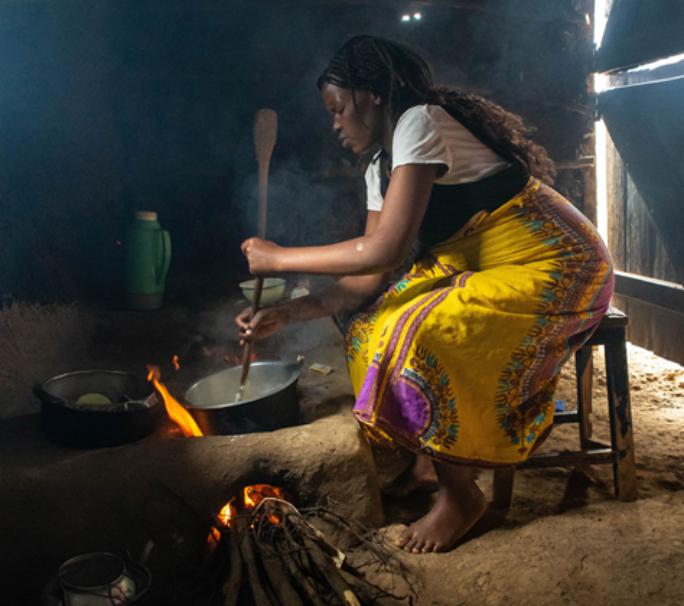NIHR CLEAN-Air(Africa) Global Health Research Group
Globally 3 billion people rely on polluting solid fuels for cooking and heating their homes. Exposure to smoke from burning these fuels is associated with a range of non-communicable diseases and in Africa is responsible for more premature deaths (estimated to be 520,000 annually) and illness than malaria.
To address this major public health issue CLEAN-Air(Africa) aims to inform national policies to scale access to and adoption of clean household energy and strengthen health systems to empower community led prevention.
About
Led by research experts, physicians and academics from the Universities of Liverpool, Moi (Kenya) and Ghana, Douala General Hospital (Cameroon) and Kintampo Health Research Centre (Ghana), CLEAN-Air(Africa) is funded by the UK National Institute of Health Research to provide evidence for policies to address the burden of non-communicable disease from household air pollution. The CLEAN-Air(Africa) Global Health Research Group is conducting a program of mixed-methods research in Cameroon, Ghana and Kenya to support communities adopt clean household energy alongside national government policies to scale household use of liquified petroleum gas (LPG) to reduce the negative impacts on health, deforestation and climate of reliance on solid fuels for cooking and heating.
CLEAN-Air(Africa) is also conducting a program of capacity building engaging with the health systems (ministries of health, health education, WHO country offices) to provide training for health work forces on household air pollution and health to (i) raise population awareness of household air pollution as a major risk factor for health and (ii) understand prevention strategies through clean household energy and harm minimisation.
Developing the program for CLEAN-Air(Africa)
The program of research and health systems capacity building for CLEAN-Air(Africa) was informed by a structured 6-month developmental scoping phase.
This phase involved site visits to each focus country to (i) liaise with ministry level stakeholders from energy, development and health to understand current programs/ initiatives on scaling clean energy and opportunities for raising population awareness on household air pollution, and (ii) develop a structured program of research and health systems capacity building in each focus country. The site visits also helped identify opportunities for CLEAN-Air(Africa) to maximise its impact through strengthening partnerships with relevant policy makers. Examples of these opportunities include:
Kenya 13/5/18 - 19/7/18

During the site visit to Kenya a meeting with the Deputy Director of Public Health (Dr James Mwitari) from the Kenyan Ministry of Health highlighted the national revision of the Kenyan community health worker (CHW) training curriculum as part of the Universal Health Coverage program directed by the President. Discussions highlighted the need for a bespoke module on household air pollution currently missing from the curriculum, despite a high level of awareness of the associated public health issues of HAP at MoH level. An opportunity to contribute to a new HAP module was directly relevant to the aspirations of CLEAN-Air(Africa) to strengthen health systems around HAP prevention with CHWs being a primary focus for related activities. Following scoping CLEAN-Air(Africa) has been working closely with the MoH to support development of this module to coincide with the launch of the new curriculum in early 2020.
Kenya visit report (Microsoft Word)
Cameroon 30/6/18 - 7/7/18

After meeting the regional delegate for the Ministry for the Promotion of Women and the Family (MINPROF) the team were invited to attend a meeting with the minister - Mme Omdoa. The minister highlighted the potential for CLEAN-Air(Africa) to raise awareness of household air pollution (HAP) and the benefits of cleaner cooking at the Cameroon International Day for Rural Women (CIDRW) (held annually in October). With support from MINPROF, CLEAN-Air(Africa) held the first conference on HAP and clean cooking in Mbalmayo on October 15th 2018 attended by 300 local women (this is now an annual event hosted by CLEAN-Air(Africa) for the CIDRW.
Cameroon visit report (Microsoft Word)
Ghana 18/6/18 - 25/6/18
The Ghanaian government is changing its current model of domestic liquified petroleum gas (LPG) ownership from the unsafe and unsustainable model, whereby households own their cylinders and decant LPG for approved (and unapproved) retailers. The new 'cylinder recirculation model' (CRM) puts the responsibility for safety on the marketer with households paying a deposit on cylinders and exchange empty cylinders for full ones with retailers selling the marketer brands. At the Ghanaian site visit we identified that the rollout of the new model coincided with the CLEAN-Air(Africa) research program. A meeting with the National Petroleum Authority, tasked with implementing the new CRM, identified an opportunity for us to work directly with the initial pilot phase through our partner (Kintampo Health Research Centre).